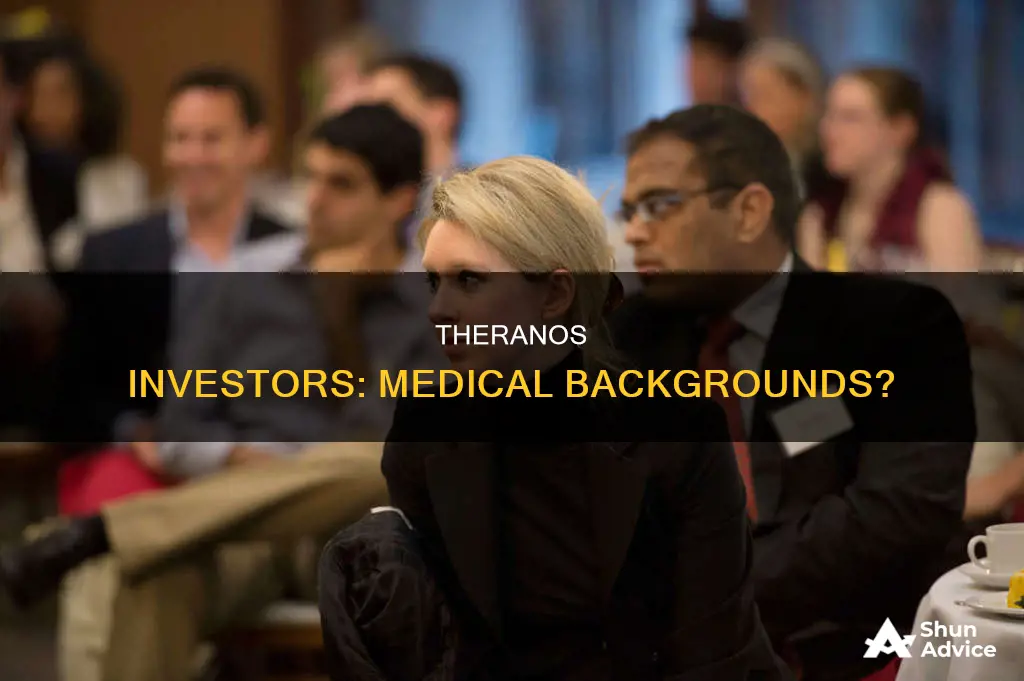
Theranos Inc. was a privately held healthcare technology company founded by Elizabeth Holmes in 2003. Holmes dropped out of Stanford University at the age of 19 to start the company, which she claimed had developed a new technology to test blood. Theranos raised more than $700 million from venture capitalists and private investors, resulting in a valuation of $10 billion at its peak in 2013 and 2014. However, in 2015, it was revealed that Theranos's technology was never demonstrated, and the assertions made by Holmes and former company president Ramesh Sunny Balwani amounted to deceit. The company was charged with fraud by the SEC in 2018, and both Holmes and Balwani were imprisoned for defrauding investors and patients. So, did the people who invested in Theranos have medical backgrounds? The answer appears to be no. Notable investors include media mogul Rupert Murdoch, billionaire venture capitalist Tim Draper, Oracle founder Larry Ellison, and members of America's wealthiest family, the Waltons.
| Characteristics | Values |
|---|---|
| Number of investors | 14 named investors |
| Investor professions | Media mogul, retail chain, pharmacy giant, venture capitalist, software engineer, investor, entrepreneur, business tycoon, lawyer, football team owner, investment advisor, author, professor, journalist, family members of politicians |
| Investor net worth | $1 million to $175 billion |
| Amount invested | $1 million to $150 million |
What You'll Learn
- Theranos investors included Rupert Murdoch, the Walton family, Betsy DeVos' family, and Robert Kraft
- Theranos was founded by Elizabeth Holmes, who was found guilty of fraud
- Theranos claimed to have developed devices to automate and miniaturise blood tests
- Theranos was exposed by John Carreyrou, a journalist for the Wall Street Journal
- Theranos was sued by Walgreens for breach of contract

Theranos investors included Rupert Murdoch, the Walton family, Betsy DeVos' family, and Robert Kraft
Theranos was a privately held American corporation founded in 2003 by Elizabeth Holmes, a then 19-year-old Stanford University dropout. The company claimed to have developed devices to automate and miniaturize blood tests, revolutionizing the lab industry by using a few drops of blood from a simple finger-prick to look for everything from diabetes to cancer. However, these claims were later proven to be false. Despite the red flags, Theranos attracted investments from several high-profile individuals, including Rupert Murdoch, the Walton family, Betsy DeVos and her family, and Robert Kraft.
Rupert Murdoch, a media mogul, invested a significant amount of money in Theranos, reportedly losing $100 million when the company failed to deliver on its promises. Murdoch was one of the biggest beneficiaries of the $452 million bill slapped on Elizabeth Holmes, as she was ordered to pay restitution to those duped by her hoax blood-testing business.
The Walton family, the family of Wal-Mart founder Sam Walton, was also among the high-profile investors who lost money in the Theranos scandal. They invested $150 million in the company, which was ultimately rendered worthless when Theranos ceased operations in 2018.
Betsy DeVos, the former secretary of education, and her family were misled by Theranos founder Elizabeth Holmes before investing $100 million in the company. DeVos' investment arm, RDV Corp., was intrigued by Holmes' claims that Theranos' devices were being used in military helicopters and with pharmaceutical companies. However, these claims were later proven to be false.
Robert Kraft, the owner of the New England Patriots and a successful businessman, also invested in Theranos. While the exact amount of his investment is not publicly known, it is estimated that he lost a portion of his $5.2 billion fortune due to his bet on the company.
Middle-Aged Investors: Saving Enough?
You may want to see also

Theranos was founded by Elizabeth Holmes, who was found guilty of fraud
Theranos was founded by Elizabeth Holmes, a Stanford dropout who started the company when she was just 19 years old. Holmes claimed that Theranos had developed a new technology to test blood, requiring only a small amount of blood and able to perform tests rapidly and accurately. These claims were later proven to be false.
Holmes was found guilty of fraud and sentenced to 11 years and 3 months in prison. The company she founded, Theranos, was valued at $10 billion at its peak in 2013 and 2014, and raised more than $700 million from venture capitalists and private investors. However, it all came crashing down after a series of explosive reports by The Wall Street Journal reporter John Carreyrou, who called into question the efficacy of Theranos' technology. It was revealed that Theranos used traditional blood testing machines for most of its tests, and its own technology could produce inaccurate results.
The turning point came in 2015 when medical research professor John Ioannidis, along with professor of clinical biochemistry Eleftherios Diamandis and investigative journalist John Carreyrou, questioned the validity of Theranos' technology. The company faced legal and commercial challenges from various authorities, investors, patients, and others. By June 2016, Forbes estimated Holmes' net worth had dropped from $4.5 billion to nothing. Theranos was charged with fraud by the SEC in 2018, and Holmes was found guilty of four counts of wire fraud and one count of conspiracy to commit wire fraud in January 2022. She was sentenced to prison in November 2022.
The story of Theranos and its founder, Elizabeth Holmes, has captivated and appalled people worldwide. It is a cautionary tale of deception and fraud, with Holmes found guilty and sentenced to prison. The company's investors included prominent individuals and families such as Tim Draper, Larry Ellison, Rupert Murdoch, the Walton family, Betsy DeVos' family, and the Oppenheimer family, among others. Theranos' board of directors also included notable figures like Henry Kissinger and Jim Mattis.
Fear of Investing: Why the Hesitation?
You may want to see also

Theranos claimed to have developed devices to automate and miniaturise blood tests
One of the patents for the Edison described a point-of-care system that could communicate with the internet to receive instructions for which blood tests to run on the samples, before communicating these results back through the internet. The results would then be compared to medical data available on the internet, with the Edison running supplementary blood tests that were more targeted based on the results of the comparison. However, the patent was unclear on how much blood the Edison would actually require to conduct these blood tests. In one section, the patent claimed the sample needed to consist of about 10 drops of blood, but in another section, the Edison would need less than one drop.
In 2016, Theranos introduced a new robotic capillary blood-testing unit named "miniLab". The miniLab was allegedly capable of carrying out a range of tests from a small amount of blood. However, Theranos failed to address concerns that it had exaggerated the capabilities of the miniLab, and Walgreens withdrew from their partnership. It was later revealed that Theranos had voided two years of test results showing inaccuracies with the Edison technology.
Investing: Nice People Turn Nasty
You may want to see also

Theranos was exposed by John Carreyrou, a journalist for the Wall Street Journal
Theranos was a privately held healthcare technology company founded by Elizabeth Holmes in 2003. The company claimed to have developed a new technology to test blood, but these claims were later discovered to be fraudulent.
In 2015, Theranos was exposed by investigative journalist John Carreyrou of The Wall Street Journal. Carreyrou reported that Theranos was using traditional blood-testing machines instead of its own Edison devices, and that the Edison machines might provide inaccurate results. This was a turning point for the company, which subsequently faced a string of legal and commercial challenges.
Carreyrou's reporting was based on interviews with ex-employees and a key source, Tyler Shultz, a former Theranos employee and the grandson of then-Theranos director George P. Shultz. Shultz had attempted to address his concerns internally and, when that failed, he spoke to Carreyrou and also reported Theranos to the New York State Department of Health for CLIA violations.
Following the initial exposé, Theranos claimed that the allegations were “factually and scientifically erroneous." However, the Wall Street Journal stood by its reporting, and the story triggered a series of events that ultimately led to the downfall of Theranos and the imprisonment of its founder, Elizabeth Holmes.
In the aftermath of the exposé, Theranos faced scrutiny from government agencies, including the Food and Drug Administration (FDA) and the Centers for Medicare and Medicaid Services (CMS). The FDA released reports from its ongoing investigation, citing issues such as "uncleared medical device(s)," poor records, mishandling of complaints, and failure to conduct audits. Meanwhile, the CMS sent a letter to Theranos, reporting that one of its laboratories posed "immediate jeopardy to patient health and safety."
As a result of these findings, Theranos was subjected to sanctions, including the suspension of Holmes and former company president, Sunny Balwani, from owning or operating any certified clinical laboratory for two years. The company also faced criminal investigations and requests for information from government agencies.
In addition to government scrutiny, Theranos lost partnerships and faced lawsuits from former partners such as Walgreens and Safeway. The U.S. Securities and Exchange Commission (SEC) formally charged Theranos, Holmes, and Balwani with "massive fraud," alleging that the company had deceived investors about its performance and technology.
The exposure of Theranos by John Carreyrou and The Wall Street Journal played a pivotal role in revealing the truth about the company's fraudulent claims and safeguarding the public interest. It led to significant consequences for Theranos and its founders, demonstrating the power of investigative journalism in holding companies accountable and protecting the public from harmful practices.
Investments: The Drive to Gain More
You may want to see also

Theranos was sued by Walgreens for breach of contract
Theranos was a privately held healthcare technology company founded by Elizabeth Holmes in 2003. Holmes claimed that the company had developed a new technology to test blood, but these claims were later discovered to be fraudulent. In 2013, Theranos partnered with Walgreens to offer in-store blood tests at more than 40 locations. However, in 2016, Walgreens terminated its partnership with Theranos and filed a lawsuit against the company for breach of contract.
Walgreens sued Theranos in federal court in Delaware, seeking to recover its investment in the company. The drugstore giant alleged that Theranos had breached a contract between the two companies and was seeking $140 million in damages, equal to the amount it had invested. Walgreens declined to comment on the lawsuit beyond confirming that it had been filed.
Theranos, for its part, denied the allegations and claimed that Walgreens had mishandled their partnership and caused significant harm to Theranos and its investors. The company stated that it would respond vigorously to Walgreens' allegations.
The lawsuit between Walgreens and Theranos came amid a string of legal and commercial challenges for Theranos. The company faced lawsuits and sanctions from medical authorities, investors, government agencies, former business partners, and patients, among others. By 2018, Theranos had ceased operations and released its assets and remaining cash to creditors.
Poor People: Investing Risk?
You may want to see also
Frequently asked questions
Theranos was a privately held corporation that raised more than $700 million from venture capitalists and private investors. Some of the most prominent investors included Tim Draper, Larry Ellison, Rupert Murdoch, the Walton family, the DeVos family, and Robert Kraft, none of whom have publicly disclosed medical backgrounds.
Theranos was a healthcare startup founded by Elizabeth Holmes in 2003. The company claimed to have developed devices to automate and miniaturize blood tests, requiring only a small amount of blood. These claims were later proven false.
In 2015, investigative journalist John Carreyrou of The Wall Street Journal questioned the validity of Theranos's technology. This sparked a series of legal and commercial challenges, ultimately leading to the company's dissolution in 2018.
Elizabeth Holmes was charged with criminal fraud and found guilty of defrauding investors. She was sentenced to over eleven years in prison.







